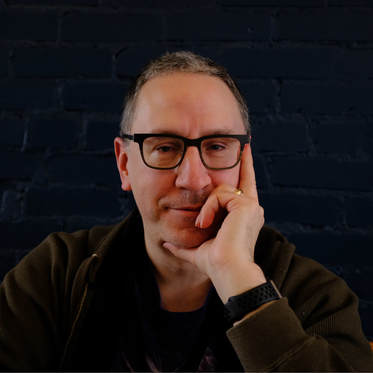 Gene Doucette doesn’t necessarily like to play in the genre sandbox to which sci-fi is typically confined. The Spaceship Next Door, for example, reads like the literary love child of The Hitchhikers Guide to the Galaxy and The Gilmore Girls (or so I said in my Goodreads review). He creates distinctive voices and characters, which is a breath of fresh air, especially when you’re fighting aliens and whatnot. When did you first realize you were a storyteller? I’m pretty sure I never had such a moment, or if I did, it didn’t happen in the way the question implies. I decided I was going to be a writer at roughly the same time I learned how to read. Probably, this involved Shel Silverstein, only because the earliest recorded piece of writing from my hand is a poem in big block letters, recounting how six-year-old me felt about snow. But I didn’t discover I had a gift for writing—or storytelling in general—and then decide to start doing this; I spent my life working out what kind of person I needed to be in order to become a writer. What do you love about the writing process? The surprises. It’s great getting into a rhythm in a story and then having it go somewhere unexpected. I know I’m writing the thing, but when the plot twist pops up, I’m as surprised as anybody. What is the hardest part of being a writer? This goes in hand with the best part about the writing process, above. Here’s the thing: I don’t outline, and I barely plan ahead. I’m completely at the whims of my own unconscious mind, which apparently knows what it’s doing. That’s what’s really going on when I say a plot twist surprises me. I mean, it’s can’t really be that big of a surprise if I’m the one setting it up and revealing it. But I don’t always know I’m doing that until I get there. The hardest part is trusting that there’s something going on in my head that knows what it’s doing. This is terrifying, because I will dive into a book with exactly no idea how it’s going to play out, until it does. Where do you find your inspiration? Not a clue. Some unholy mixture of non-fiction reading, fiction reading, and I-couldn’t-tell-you-because-I-don’t-know-either. The non-fiction is to discover something new and neat. The fiction is generally for more technical reasons: figuring out how someone else solved the problem of storytelling. The I-couldn’t-tell-you part is the catalyst, though. Sometimes all I start with is something I thought was neat, sometimes with a story structure I learned from another novelist. Sometimes it just struck me one day that such-and-such a thing would be fun to try and write. Basically, I have no idea. What are you working on right now? I’m in the middle of a new book for my Immortal novel series. I feel kind of bad about having put this off as long as I did, since I ended book four on something like a cliffhanger. Assuming I get this out on schedule, it will have been two years since Immortal and the Island of Impossible Things. I get emails semi-regularly from fans who want to know what happens next, and I sympathize, since I don’t really know what happens next either. But I’m working on finding that out. While he might know yet what’s coming up next, you probably should spend some time at his website to be among the first to find out.
0 Comments
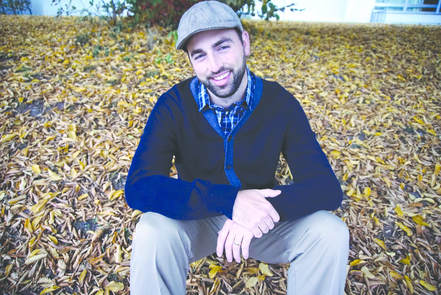 In Nyxia, the first book a YA trilogy that reads like Ender’s Game” meets “The Hunger Games”, Scott Reintgan weaves together an engaging tale for sci-fi readers of all ages. A self-described “back-row dreamer” Scott is a former English teacher dedicated to engaging readers through exciting characters and storylines. Nyxia Unleashed, book two of the Nyxia Triad, releases July 17th. When did you first realize you were a storyteller? Storytelling clicked for me through video games. As I walked through quests in World of Warcraft and other games, I realized I loved all the narrative piece that tied everything together. That love grew with my love for reading, which eventually grew into my love for writing. I still use the fact that video games paved the path for my career against my mother. What do you love about the writing process? I love the act of creation. There is just nothing quite like that first spark of an idea, that first time we meet the bad guy, that first time we realize how it all will end. I'm actually a big fan of revision, too, which ends up being more like a puzzle that you have to slowly fit together. But that first run through of creating the story and the characters and the setting? It's the best. What is the hardest part of being a writer? The hardest part about being a writer is learning balance. Wiley Cash had a great Twitter thread about this recently, but the image of writers sitting a desk every day for 10 hours, humming along in story world, is just a little inaccurate. Writing involves so much more. Learning how to balance publicity and marketing and still being able to spend time with the characters we love? That's one of the hardest lessons I've had to figure out. Where do you find your inspiration? Inspiration is everywhere. I actually just gave a talk to local students where I discussed collaborating with the world around you. Opening up your eyes. Taking a step back. Listening closely. These are hallmarks of a great author in my opinion. Those threads of reality that we can pluck in our day to day end up being the core pieces of great stories. Just remember to write down those ideas as they come. Far too many authors have had wonderful ideas slip through their fingers for lack of a pen. What are you working on right now? Right now I'm working on the second novel in a middle grade series (the first one--When in Fancy--will release from Random House in 2020). I've finished the entire Nyxia series. Nyxia Unleashed comes out on July 17th, but book three will release in April 2019. I'm excited for people to read the conclusion. And as always, I'm working on like three other books simultaneously because I can't stop dabbling in all these lovely little ideas that come across the brain. To find out more about the North Carolinian wordsmith and us his new adventures, check out his website. 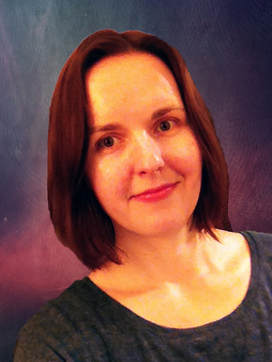 Science Fiction always seems to fall into two camps: an action/love story with scant (and sometimes questionable) sci-fi details thrown in or a jumble of so many technical specs that you forgot the two main characters are locked in a death battle 200 miles above the planet's surface. Thankfully Vera Brook, a scientist-turned-writer does not succumb to these faults. Her older YA novels Sand Runner and Cage Runner are fast-paced action stories with just the right amount of scientific detail for the story to flow and make sense. When did you first realize you were a storyteller? Good question. I’ve been a bookworm ever since I was a kid. If you love reading, chances are at some point you will reach for a pen and start writing. I’ve kept journals with story ideas ever since middle school. So that itch to make up stories was always there. I was also an English major in undergrad and took some creative writing classes where we wrote and critiqued each other’s stories. But I didn’t try to write a novel until years later, after I switched my career path to science. I guess it’s a sign that I’ve always been a storyteller at heart. What do you love about the writing process? Writing is an amazing activity. You start with nothing but a blank page and your imagination & life experience, and you can create whole new worlds. I love that creative freedom, and the feeling that there are no limits to what I can imagine and write about. I also love the surprises that come in the process of writing fiction. For me, writing is half careful, deliberate construction, and half a discovery process. The initial idea for a story or a novel can come from anywhere, and that’s always a thrill. (My advice: Write all the story ideas down. You may think you will remember them, but you won’t.) But after the initial idea, it can take me a good while to figure out the logic of the story and to fill in the details, and the final draft can be completely different from that original spark of inspiration. I also love creating—or discovering—my characters. They feel very real to me. Sometimes they even refuse to do what I want them to do, and I have to listen to them and change the story accordingly, or it won’t work. It’s a very strange experience, being bossed around by imaginary people you created, but I’m sure many writers can relate to that. Finally, I continue to be amazed by how mysterious the writing process is. Where do our ideas really come from? How do we put them together to weave a story? How do we switch from the free creative writer that puts the words down on the page, to the logical, critical editor who beats them into shape and fits them into a careful story structure? Language itself is a fascinating phenomenon and very closely tied to our humanity. I’m trained in neuroscience, and neuroscience tries to understand how everything we do works at the level of brain processes, down to neurons firing and neurotransmitters crossing the synapse. I don’t think we can explain anything as complex as creative writing, or language in general, at the neuronal level yet. Some clues may actually come from computer science and the development of AI that assists writers in either writing or editing their work. So I look forward to the breakthroughs that will come in the near future. I love writing—but it’s also the hardest and most frustrating activity I’ve ever done. So I wouldn’t mind an AI assistant who would help me get all the stories in my head down on paper faster and with less of a struggle. What is the hardest part of being a writer? All of it! The same things that make writing amazing also make it incredibly difficult. You are free to create whole new worlds, and write any story you want—but all of it takes a great deal of work, frustration, and trial and error. There is also no guarantee that your book will resonate with readers, or even be discovered by the readers who might enjoy it. So every book you write is a huge leap of faith, and you don’t know what’s going to happen at the end. All you can do is write the best book you can, keep improving your craft with every book after that, and not let silence or negative reviews discourage you form writing. I’m an indie writer—meaning, independently published—so discoverability is also a huge challenge. Indie authors are their own publishers. In addition to writing the book, I also format it for print and ebook, create my own covers, distribute the book on different platforms, and market it. (Although I do work with a professional, paid editor, to make sure my books are written to professional standards.) I actually enjoy all these publishing tasks, and I’m really glad I had to learn them. But marketing my books is difficult, because I have a very small budget to work with, and not much time to spare. (I have a full-time job which pays my bills, and I would rather spend my free time on writing than on marketing.) Still, this is a very exciting time to be an independently published author, and the difference between indie writers and traditionally published writers blurs a little more every day! For instance, the Science Fiction and Fantasy Writers of America (SFWA) has opened its doors to indie writers becoming members, and I’m sure other professional writing organizations are doing the same. And more and more indie writers can make a living on their books, often by developing strong online platforms and turning their books into multiple streams of income, which is great to see and very encouraging. The indie writing community is also very open & supportive, and that makes a huge difference because writing can be pretty lonely otherwise. It’s not a zero-sum game at all. We are all rooting for one another, and celebrating one another’s successes. More writers means more great books to read, and what’s not to love about that? Where do you find your inspiration? A story idea can come from anywhere—a dream, a scientific article I read, an experience I had as a kid, an overheard conversation, and, of course, other books. Also, giving yourself a break from writing to “recharge” helps. Whenever I get stuck in my writing, I go for a walk and just let my mind roam. It’s like you give your conscious mind a rest, but your unconscious brain keeps working on the problem, and I often have a solution by the time I come back from the walk. A lot of my writing is also inspired by my neuroscience training, and my interest in science and technology in general. I write science fiction, so there is usually some science and technology as the background for the story. For instance, in the Sand Runner series, one such technology is bionic prosthetics, or the new generation of prosthetic limbs that are directly linked to and controlled by the person’s nervous system. Such prosthetic limbs already exist and people use them every day, and they will get better and better, and make a huge difference to thousands of people. But it’s amazing to think about how much knowledge about the human nervous system went into designing such prostheses. So both the science and the applications are fascinating and a great source of story ideas. What are you working on right now? I’m usually juggling several projects. It’s probably not the fastest way to finish anything. But I find that it helps, because if I get stuck on one project, for whatever reason, I can switch to another and work on that. Right now my main project is book 3 in the Sand Runner series. It’s challenging because the story and the cast have gotten bigger and more complicated, and I have to be careful not to write myself into a corner. But I love these characters, both the “old” ones from book 1, like Kai, Emily, and Neen, and the newer ones, who appear only in book 2 or book 3. So it’s always a thrill to enter this world and to add another chapter to their story. I hope to finish, edit, and publish book 3 by the end of this summer. But I’m not a very fast writer, so we’ll see. I’m also working on some short stories, some tied into the Sand Runner series, others standalones. And I have, let’s see, four other series in development. Two of them are YA science fiction. The other two are middle grade (MG), and start more in the vein of magical realism but will “grow up” to be science fiction as the characters get older. To keep up with the Vera's latest adventures, check out her website, or follow her on Twitter or Pintrest. 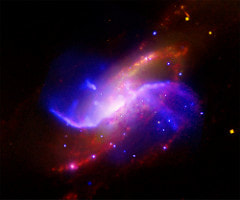 Creative Commons photo by the NASA Marshall Space Flight Center Creative Commons photo by the NASA Marshall Space Flight Center Note: this post appeared on another blog I run, but I thought I would share it here as well since it is related to the theme of creativity and storytelling. This fall, two space-faring shows debuted. One of them arrived to much fanfare and buzz as it was the next iteration of the famed Star Trek legacy. The other one, while hyped, premiered after an NFL game on Fox to much less confetti and pizzazz. It would be easy to write about the technical advancements of Star Trek: Discovery, the beautiful filming, the early focus on the Klingons rather than the Federation or the bold move to debut the show on traditional television and then move it to streaming video in an effort to be on the new wave of entertainment consumption. But, despite all the hoopla, I wasn’t that impressed, and it’s not because I’m a fair-weather friend of the franchise. While too young to view the original series on TV when it debuted, I’ve watched all the movies (even the bad ones) and sampled each of the TV shows. The problem is that the new series is too much like the movies, which are fun to be sure, but best in small doses. The first episode seemed to me more enamored with the technology than with the characters. And, with my lack of desire to sign-up for yet another streaming service, the move simply signed its fate in my book. On the other hand, The Orville, which is created to be a strange brew of science fiction and comedy (an updated TV version of Galaxy Quest), shouldn’t work at all. Science fiction aficionados (OK, nerds or geeks is probably more appropriate here. I use these terms lovingly, as my sci-fi Nerd Card is completely up to date) don’t want to laugh, unless this joke has something to do with a pun about warp signatures, and those who like comedies don’t care about the technology being accurate, just funny (Spaceballs anyone?). Yet, the thing is that Seth MacFarlane makes it work somehow. The secret of his success is that while he knows funny, he clearly appreciates the science fiction genre as well. Bringing on people like executive producer Brandon Braga and directors like Jon Cassar and Jonathan Frakes, shows MacFarlane is serious about giving the show some street cred. For better or worse, the show checks off the requisite boxes: Uplifting Theme Music — Check Smooth Tech Design — Check Juvenile Humor — Double Check Yet for every sophomoric reference to fooling around or going to the bathroom, you have a flip side of the narrative coin in which characters chart the murky waters of themes such as gender empowerment and identity, the battle of religion over science, animal cruelty, time travel and whether killing a few to save many is a justifiable sacrifice or makes you someone without a conscience. Even some of the smaller elements show an attention to detail. The green Kermit the Frog on Capt. Mercer’s desk gets all the focus, but if you look closely, you will see the wooden model of the Wright Brothers’ biplane, an obvious homage to the ship’s namesake. The best part of the is one most of us don’t think about. For decades, we have always revered the characters in science fiction tales because they are much better people than we would ever be. They are brave and composed in the face of situations that would make us lose our lunch or wet our pants. Imagine, however, if instead of pulling your candidates for space exploration not from the ranks of NASA, but the chairs and couches of “Central Perk.” If you think about it, the goofy humor and silly antics sprinkled through each episode make it more like an episode of Friends than a Shakespearean cast with grown-up onesies and phasers (again, I loved ST:TNG as a kid). The anachronistic jokes and references might seem a bit contrived, but those in the Star Trek timeline always like to make a pit stop in whatever generation the show/film was written (using the Beastie Boys “Sabotage” as “classical music” in Star Trek Beyond is just the latest example). Sure Malloy and LaMarr act at times like irrepressible teenagers on the bridge and Mercer and Grayson are the adults whose own fractured relationship is the source of joking and scuttlebutt, but Bortus and Issac provide logic in times of peril and Kitan is this generation’s Wesley Crusher, filled with youthful energy, but unsure of her own ability to lead. With supporting actors like Larry Joe Campbell and Penny Johnson Jerald (no stranger to the Star Trek world herself), you’ve got a good crew running the ship. And MacFarlane and Co. has been smart enough to engineer a few guest appearances make the show even more fun. The Orville has no illusions about what it is — a weekly science fiction serial that’s determined to explore the universe even if it slips on a banana peel along the way. In a TV and film universe where our space travelers are heroes who stare down danger with a steely glare before setting phasers to kill, The Orville is, simply put, science fiction for the rest of us. 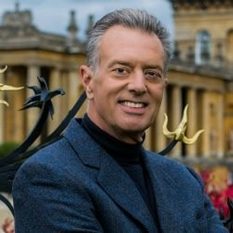 I have been a fan of Thomas’ work for years and read just about everything he has written, so I was delighted to have the chance to connect with him about the creative process. An award-winning, best-selling author, his weaves together great stories about the past, present and future with style and skill. The globe-trotting Oxford don divides his time between Florida and England and has most recently delved into the realms of epic fantasy, science fiction and techno-thrillers. When did you first realize you were a storyteller? I came to faith at age 28 and started writing two weeks later. Up to that point, I had never picked up a pen for anything longer than a business report. Two days into the experience, I knew there was nothing else I wanted to do with the rest of my life. This desire was tested, tempered, and used (I think) for the basis of learning the true meaning of spiritual discipline. I wrote for nine years and completed seven books before my first was accepted for publication. During that time, I ran a business consulting group based in Germany. I traveled to two and sometimes three countries every week. My goal was to maintain a twenty-hour workweek on top of that for the writing. I failed a lot. But I also learned to focus. What do you love about the writing process? There is a deep and permanent bond between my spiritual walk and my creative process. A great deal of who I am as a believer is bound by what I write, and how this creative process unfolds. What is the hardest part of being a writer? I would imagine most writers say something about the commercial process, such as dealing with rejection, or the uncertainties bound in the market and what it means to release a work. For me, all those are tough. But the hardest thing is time. I have so much I want to do, so many stories I want to tell. And there are just so many hours granted to us. NEED TO BREATHE has a song on their latest album titled "We Don't Get To Be Here Long". That song cuts like a knife. Where do you find your inspiration? It depends on the book. For a number of the Thomas Locke titles, there is an element of spiritual awakening, even in stories that have no overt spiritual component. I have had some of the most profound, and profoundly disturbing, dreams of my entire life become foundations of these stories. What are you working on right now? The Emissary series has been acquired by a UK film group, who hope to enter pre-production in April. I was contracted to write the screenplay. This has become a huge element in my current schedule. You can find out more about Thomas and his latest projects at www.tlocke.com. |
AuthorI've been writing stories and taking photos since I was old enough to hold a pencil and stand behind a tripod. Archives
February 2024
Categories
All
|
 RSS Feed
RSS Feed